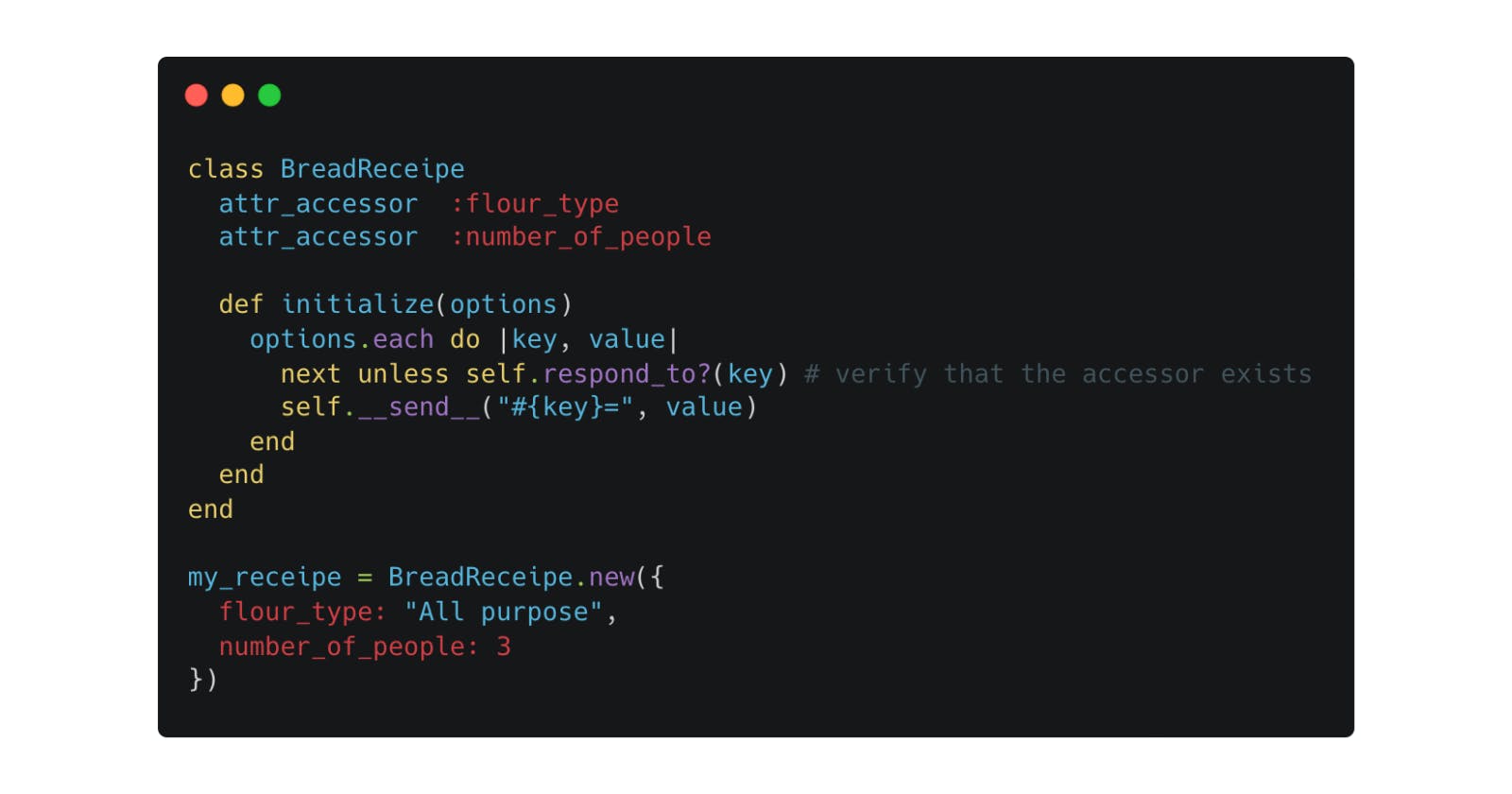I was inspired to write this article by a question asked by Adrian Marin in the Twitter Ruby on Rails community and the responses I read there.
Context
Let's say there you want to create a class that can accept in initializer a number of keyword arguments that will be used to set defaults for instance variables with the same name as the keyword arguments.
Example:
class Receipe
attr_accessor :flour_type
attr_accessor :number_of_people
def initialize(flour_type:, number_of_people: )
@flour_type = flour_type
@number_of_people = number_of_people
end
end
Problem
As described by Adrian, you notice that if you add more variables, the number of lines in the initializer will increase with each variable you add there.
Let's say you want to add 4 more variables:
class BreadReceipe
attr_accessor :flour_type
attr_accessor :number_of_people
attr_accessor :salt
attr_accessor :water
attr_accessor :yeast
attr_accessor :oven_time
def initialize(flour_type:, number_of_people:, salt: , water: , yeast: , oven_time: )
@flour_type = flour_type
@number_of_people = number_of_people
@salt = salt
@water = water
@yeast = yeast
@oven_time = oven_time
end
end
Solutions
You can find all solutions on Replit.com.
Refactor to use hash
Solution idea proposed by @sairam here.
One option is to refactor this to accept a hash as an argument and use a little bit of meta-programming:
class BreadReceipe
attr_accessor :flour_type
attr_accessor :number_of_people
def initialize(options)
options.each do |key, value|
next unless self.respond_to?(key) # verify that the accessor exists
self.__send__("#{key}=", value)
end
end
end
my_receipe = BreadReceipe.new({
flour_type: "All purpose",
number_of_people: 3
})
A possible problem (or feature) with writing the initializer like this is that it will initialize instance variables even if you define them as attr_readers.
If you want to restrict the initializer to only initialize attributes defined with attr_writer, replace self.__send__ with self.public_send and add one more check inside the loop:
options.each do |key, value|
next unless self.respond_to?(":#{key}=") # verify that the writer exists
self.public_send("#{key}=", value)
end
For a more example of robust code, I recommend you check how the ActiveModel::AttributeAssignment is doing the assignment. I will also talk about this a little bit below in the ActiveModel example.
Tapping into object initializer
Another option is not to initialize the instance variables in the initializer and assign them when creating a new object:
class BreadReceipe
attr_accessor :flour_type
attr_accessor :number_of_people
end
And in this case it matters how we initialize the object:
my_receipe = BreadReceipe.new.tap do
_1.flour_type = "All Purpose"
_1.number_of_people = 3
end
Using Dry gem
You can take a look at the Dry::Initializer gem and use that to create your class.
require 'dry-initializer'
class BreadReceipe
extend Dry::Initializer
option :flour_type
option :number_of_people
end
my_receipe = BreadReceipe.new(flour_type: "All purpose", number_of_people: 3)
This had the advantage that you can coerce or type constrain the accessors if you like.
require 'dry-initializer'
require 'dry-types'
class BreadReceipeWithCoerce
extend Dry::Initializer
option :flour_type, Dry::Types['strict.string']
option :number_of_people, Dry::Types['strict.integer']
end
begin
my_receipe = BreadReceipeWithCoerce.new(flour_type: "All Purpose", number_of_people: "13")
rescue Dry::Types::ConstraintError => e
puts e
end
Using ActiveModel::API
Solution idea proposed by @JureCindro here.
In case you are working in Rails, then you can use ActiveModel::API
require "active_model"
class BreadReceipe
include ActiveModel::API
attr_accessor :flour_type, :number_of_people
end
my_receipe = BreadReceipe.new(flour_type: "All purpose", number_of_people: 3)
If you want to see how this works, take a look at active_model/api.rb line 61 where it includes include ActiveModel::AttributeAssignment and then take a look of how the assign_attributes method works. You will notice that it does something similar with the first solution proposed here but with some validations. For example using ActiveModel::API you will not be able to instantiate from new an attr_reader accessor.
Example:
class BreadReceipeWithAttrReader
include ActiveModel::API
attr_accessor :flour_type
attr_reader :number_of_people
end
begin
with_attr_reader = BreadReceipeWithAttrReader.new(
flour_type: "All purpose",
number_of_people: 3
)
rescue ActiveModel::UnknownAttributeError => e
puts e
end
Inherit from OpenStruct
Solution proposed by @aantix here.
If you are not required to inherit your class from another specific class, you can inherit your class from OpenStruct, and then this will accept any keyword argument when initializing the object.
class BreadReceipe < ::OpenStruct
def initialize(args)
super(args)
end
end
my_receipe = BreadReceipe.new(one: "argument one", two: "argument two", flour_type: "all purpose")
The problem with this is that you can add any instance variable and by default it will be accessible for reading and writing.
You can restrict the setting but not the retrieving of a variable:
class BreadReceipeWithAttrWriter < ::OpenStruct
attr_writer :internal
attr_reader :steps
def initialize(args)
super(args)
# do some other initializing stuff
end
end
with_attr_writer = BreadReceipeWithAttrWriter.new(
flour_type: "All purpose",
number_of_people: 3,
private_variable: "payload",
steps: "cannot initialize this"
)
puts "It has steps: ", with_attr_writer.steps
puts "It can read private", with_attr_writer.private_variable
Using a class level builder method
Solution proposed by Adrian Marin here.
It might be that none of the solutions presented below work for you: either because you need to inherit from some specific class, or because you want to control explicitly what is happening.
In this case, a solution could be to build your own builder as a class method:
class BreadReceipe
class << self
def build(**args)
new_object = new # creates a new object
args.each do |key, value|
setter_method = :"#{key}="
next unless new_object.respond_to?(setter_method)
new_object.__send__(setter_method, value)
end
new_object
end
end
attr_accessor :flour_type
attr_accessor :number_of_people
attr_reader :steps
def initialize
@steps = load_steps
end
private
def load_steps
@steps = "Initial steps"
end
end
With this solution the steps variable that was declared only as the reader will not be overwritten by the .build
my_receipe = BreadReceipe.build(
flour_type: "All purpose",
number_of_people: 3,
steps: "Trying to set new steps"
)
puts my_receipe.steps # => Initial steps

